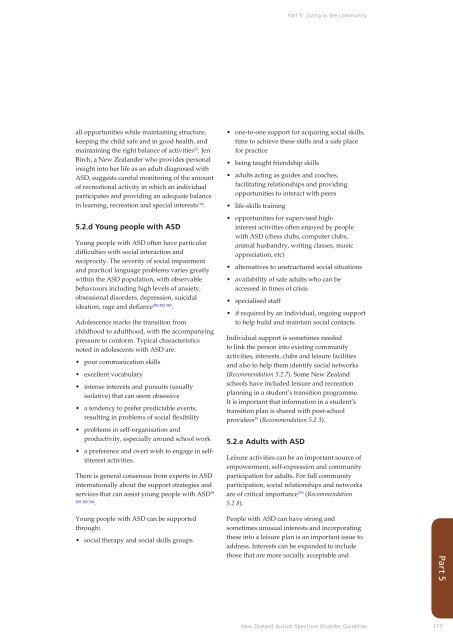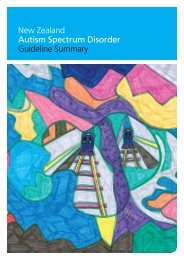New Zealand Autism Spectrum Disorder Guideline - Ministry of Health
New Zealand Autism Spectrum Disorder Guideline - Ministry of Health
New Zealand Autism Spectrum Disorder Guideline - Ministry of Health
You also want an ePaper? Increase the reach of your titles
YUMPU automatically turns print PDFs into web optimized ePapers that Google loves.
Part 5: Living in the community<br />
all opportunities while maintaining structure,<br />
keeping the child safe and in good health, and<br />
maintaining the right balance <strong>of</strong> activities 23 . Jen<br />
Birch, a <strong>New</strong> <strong>Zealand</strong>er who provides personal<br />
insight into her life as an adult diagnosed with<br />
ASD, suggests careful monitoring <strong>of</strong> the amount<br />
<strong>of</strong> recreational activity in which an individual<br />
participates and providing an adequate balance<br />
in learning, recreation and special interests 164 .<br />
5.2.d Young people with ASD<br />
Young people with ASD <strong>of</strong>ten have particular<br />
difficulties with social interaction and<br />
reciprocity. The severity <strong>of</strong> social impairment<br />
and practical language problems varies greatly<br />
within the ASD population, with observable<br />
behaviours including high levels <strong>of</strong> anxiety,<br />
obsessional disorders, depression, suicidal<br />
ideation, rage and defiance 289 382 383 .<br />
Adolescence marks the transition from<br />
childhood to adulthood, with the accompanying<br />
pressure to conform. Typical characteristics<br />
noted in adolescents with ASD are:<br />
• poor communication skills<br />
• excellent vocabulary<br />
• intense interests and pursuits (usually<br />
isolative) that can seem obsessive<br />
• a tendency to prefer predictable events,<br />
resulting in problems <strong>of</strong> social flexibility<br />
• problems in self-organisation and<br />
productivity, especially around school work<br />
• a preference and overt wish to engage in selfinterest<br />
activities.<br />
There is general consensus from experts in ASD<br />
internationally about the support strategies and<br />
services that can assist young people with ASD 39<br />
289 382 384<br />
.<br />
• one-to-one support for acquiring social skills,<br />
time to achieve these skills and a safe place<br />
for practice<br />
• being taught friendship skills<br />
• adults acting as guides and coaches,<br />
facilitating relationships and providing<br />
opportunities to interact with peers<br />
• life-skills training<br />
• opportunities for supervised highinterest<br />
activities <strong>of</strong>ten enjoyed by people<br />
with ASD (chess clubs, computer clubs,<br />
animal husbandry, writing classes, music<br />
appreciation, etc)<br />
• alternatives to unstructured social situations<br />
• availability <strong>of</strong> safe adults who can be<br />
accessed in times <strong>of</strong> crisis<br />
• specialised staff<br />
• if required by an individual, ongoing support<br />
to help build and maintain social contacts.<br />
Individual support is sometimes needed<br />
to link the person into existing community<br />
activities, interests, clubs and leisure facilities<br />
and also to help them identify social networks<br />
(Recommendation 5.2.7). Some <strong>New</strong> <strong>Zealand</strong><br />
schools have included leisure and recreation<br />
planning in a student’s transition programme.<br />
It is important that information in a student’s<br />
transition plan is shared with post-school<br />
providers 39 (Recommendation 5.2 3).<br />
5.2.e Adults with ASD<br />
Leisure activities can be an important source <strong>of</strong><br />
empowerment, self-expression and community<br />
participation for adults. For full community<br />
participation, social relationships and networks<br />
are <strong>of</strong> critical importance 376 (Recommendation<br />
5.2 8).<br />
Young people with ASD can be supported<br />
through:<br />
• social therapy and social skills groups<br />
People with ASD can have strong and<br />
sometimes unusual interests and incorporating<br />
these into a leisure plan is an important issue to<br />
address. Interests can be expanded to include<br />
those that are more socially acceptable and<br />
Part 5<br />
<strong>New</strong> <strong>Zealand</strong> <strong>Autism</strong> <strong>Spectrum</strong> <strong>Disorder</strong> <strong>Guideline</strong> 177











